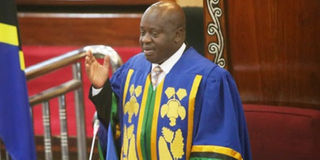Lawyers challenge Ndugai’s statement

What you need to know:
- Speaker saying Parliament would temporarily stop working with the Controller and Auditor General is bad and a threat to constitutional democracy
Dar es Salaam. A statement by National Assembly Speaker Job Ndugai that Parliament will temporarily stop working with the Controller and Auditor General (CAG) is bad and a threat to constitutional democracy, pundits observed yesterday.
Mr Ndugai told some media outlets of his decision, which went together with changes to two parliamentary committees that work closely with the office of the CAG, including the Public Accounts Committee (PAC) and Local Authority Accounts Committee (Laac).
He said work of the committees will resume after the CAG has appeared before the Parliamentary Privileges, Ethics and Powers Committee following allegations of disrespecting the legislative body.
“Otherwise we will have no interest at all to continue working with the CAG, giving him the opportunity to work with those he is convinced that are not as weak as we are,” Mr Ndugai was quoted as saying.
But Jebra Kambole, an advocate of High Court, told The Citizen yesterday that the office of the CAG, like Parliament, has been constitutionally established and it is from the same constitution that it draws its powers and authorities.
“Therefore, the Speaker’s statement means that he will no longer respect the constitutional requirements that he’s supposed to abide by. According to Section 29(I) of the Constitution, everyone, regardless of the position, has a duty to obey it. If this is the case now, the Speaker’s utterances amount to his willingness to violate this section and that his responsibilities will no longer be governed by the Constitution,” said Mr Kambole.
When contacted for comments later yesterday, the Speaker defended his decision to stop working with the CAG. He told The Citizen that the decision came naturally based on the fact that the CAG is supposed to appear before the parliamentary committee. He said once the CAG does so the recommendations made by the committee will determine further relations between the two bodies.
Sumve MP Richard Ndassa (CCM) said the office of the CAG and Parliament have always been working very closely and he was optimistic that that cooperation would continue.
For his part, the country coordinator for the Human Rights Defenders Coalition (THRDS), Mr Onesmo Ole Ngurumwa, said that if Mr Ndugai was determined to weaken the office of the CAG, then he should bring the debate to Parliament instead of choosing to go it alone.
Mr Ole Ngurumwa said he was convinced that not all lawmakers would agree with what he called Mr Ndugai’s “utter disrespect of the country’s Constitution and other laws” and there must be some who would stand for the independence of the office of the CAG.
“It is important that the lawmakers step in and force the Speaker to bring the matter for debate. This is extremely important now that the citizens of this country witness, before their eyes, the deliberate efforts to weaken the office of the CAG that is there to make sure that their taxes are appropriately utilised,” he said.
He also called upon Tanzania’s elders - who held different positions within the government in the past - to step in and intervene for the larger national interests.
According to Mr Kambole, with his relentless attacks on the office of the CAG, Mr Ndugai also makes difficult the realisation of the UN Sustainable Goal number 16 which seeks to build effective, accountable and inclusive institutions. He said that in an environment of explicit disrespect for the Constitution the dream of having strong institutions would remain both elusive and unrealistic.
Mr Daniel Marari, a lawyer, said the CAG was not answerable to the National Assembly or the Speaker, and they are not really required to “work together.”
Each one of these institutions, said Mr Marari, is required to perform its own functions and duties in accordance with the law. “The Office of the CAG is a constitutional authority mandated to oversee public spending and borrowing. CAG only needs to do his job and submit reports to the President or Parliament. If Parliament decides not to act on the reports, that is not CAG’s problem,” he said.
Commenting on the issue, University of Dodoma political scientist Paul Luisulie said the decision was very unfortunate and should have never been made.
“What this whole wrangling mean is that an ordinary citizen, who is struggling every day to keep her government up and running by making sure she pays the needed tax, will be left in the dark on how her tax is being spent,” pointed out Dr Luisulie.




